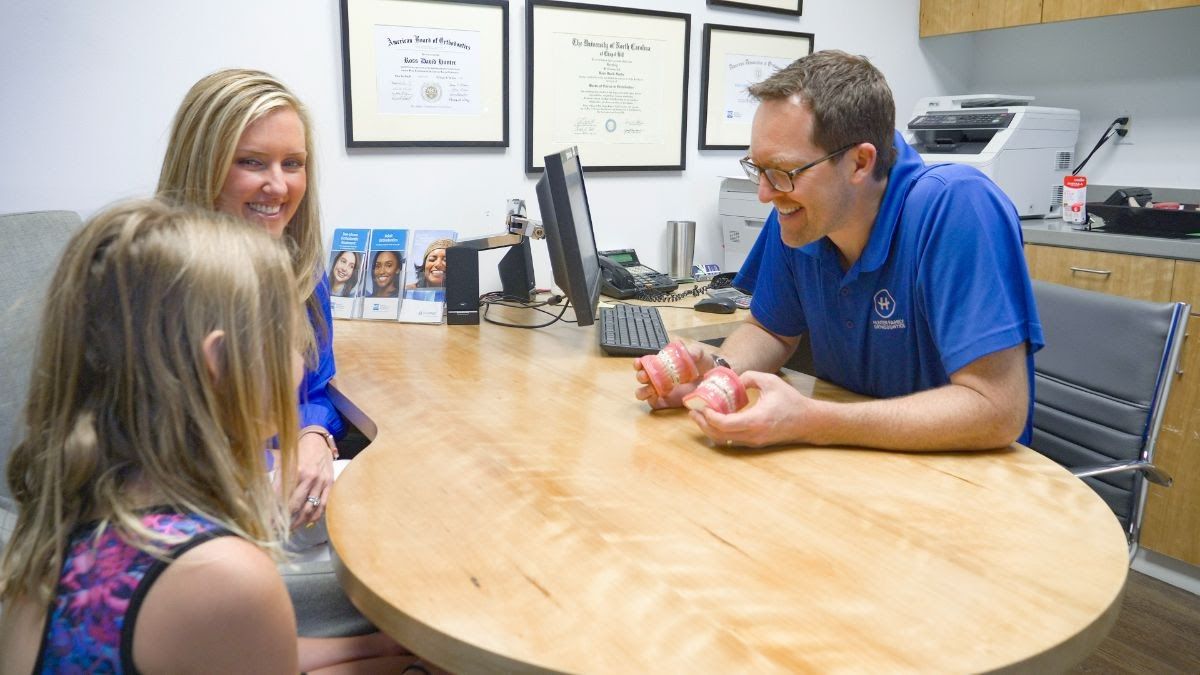Many orthodontic patients begin treatment in their teens once all the permanent teeth are in place and the results are slightly more predictable. However, orthodontics can benefit patients of all ages, including young children! In fact, the American Association of Orthodontists recommends every child has an initial screening done by about the age of seven. Even if early treatment isn’t necessary right away, the child’s growth patterns can be monitored, giving Dr. Hunter the best opportunity to identify any potential issues before they have the chance to become more serious. Once you understand why early treatment matters, you can set your child up for a lifetime of smiles!
Here at Hunter Family Orthodontics, we know that your child’s smile is as special as they are. Dr. Hunter uses a preventative treatment that’s built around a patient’s specific needs at every stage, which allows our team to provide them with exceptional care and superior results. When you schedule a free orthodontic evaluation for your child in our office in The Woodlands, Dr. Hunter will take a look at their dental development up to this point and assess their overall oral health. He’ll also check for anything that stands out and may require further observation and possible treatment, whether now and or later.
If Dr. Hunter detects any potential problems in a child between the ages of 6-9, it may prompt a treatment stage we refer to as interceptive orthodontics.
What is interceptive orthodontics?
Interceptive orthodontics, also known as Phase I orthodontics, is a process we use to identify and diagnose any issues a younger child is experiencing with the growth and development of their teeth or jaw. This allows Dr. Hunter to begin the most effective treatments at the ideal time, creating space for the proper development and eruption of the permanent teeth. Interceptive orthodontics also enhances the growth of a child’s jaw. This results in straighter teeth, improved oral health, and a more symmetrical smile.
Who is a good fit for interceptive orthodontics?
During your child’s first visit with us, Dr. Hunter will examine their teeth and jaws. If he notices any of the following, interceptive orthodontics may be recommended.
- Your child appears to be prone to a problem we want to prevent.
- Your child already has a developing problem that we now want to intercept.
- Your child’s jawbones may need some guidance as they grow.
While some developmental issues may correct themselves as a child grows, others may require intervention. Many orthodontic issues are genetic, including gapped or crowded teeth, extra or missing teeth, and several other irregularities. Other problems can be acquired through injury, premature tooth loss, or bad oral habits. Whatever the underlying cause, we know that alignment issues and other problems can affect the way your child’s smile looks, feels, and functions. Interceptive orthodontics allows us to successfully address each one of those concerns!

What are some examples of interceptive orthodontics?
Many parents we speak to in our office are concerned that an orthodontic evaluation for their child will automatically lead to early treatment, but we actually recommend this for only a small percentage of the children we see. Even if Dr. Hunter does recommend treatment, it doesn’t necessarily mean putting braces on your child right away. Many Phase I treatments don’t even use any brackets or wires! Some of these include:
- removing one or more of the primary teeth to guide the proper placement of the permanent teeth
- using expanders to widen the upper jaw and provide space for very crowded teeth
- placing teeth spacers to save a spot for permanent teeth if a primary tooth has been lost early due to injury or decay
At Hunter Family Orthodontics, we follow the normal patterns of dental growth and development in children. We can treat many problems in a child whose mouth is still developing with relative ease. However, treatment often becomes more complex and sometimes more invasive once their jawbones stop growing around the ages of 16-18.
By taking advantage of interceptive orthodontics, Dr. Hunter is often able to achieve lasting results for many common issues and lessen the impact of others! It is important to note that most patients will still require a second phase of treatment with braces or aligners to complete the alignment process.
Monitoring your child’s smile through the years
You know that regular dental visits are essential for keeping your child’s smile healthy, but did you know that regular orthodontic visits also have a multitude of benefits? Even if we don’t detect any oral issues during your child’s initial evaluation, follow-up visits as they grow to allow Dr. Hunter to:
- monitor the progress of the adult teeth as they begin to emerge
- monitor the progress of the facial and jaw development
- reduce the need for jaw surgery later in life
- guide emerging teeth into the ideal positions
- detect any hidden dental problems
- reduce the risk of impacted teeth
- reduce the risk of needing tooth extractions in the future
By proactively tackling orthodontic issues in this way, our expert team is in the best position to give children the customized care they need when they need it the most, setting them up for a lifetime of healthy smiles.

Achieve a lifetime of smiles for your child with Hunter Family Orthodontics
Like many things in life, orthodontics is best used as a preventive measure. Knowing why early treatment matters can help you to get a handle on your child’s orthodontic issues early on can help prevent the development of more serious problems later on, saving you time and money. While early treatment won’t be necessary for every child, it can truly make a huge difference for those who do need it!
With proper planning, interceptive orthodontics can help improve the tooth and jaw alignment and restore the optimal tooth and bite function. This leads to more stable results, better self-confidence, and a beautifully aligned smile! If you have a child who’s ready for their first orthodontic evaluation, we’d love to meet you both and take a look at their dental development so far. Contact us today to schedule a FREE consultation with Dr. Hunter in The Woodlands.

